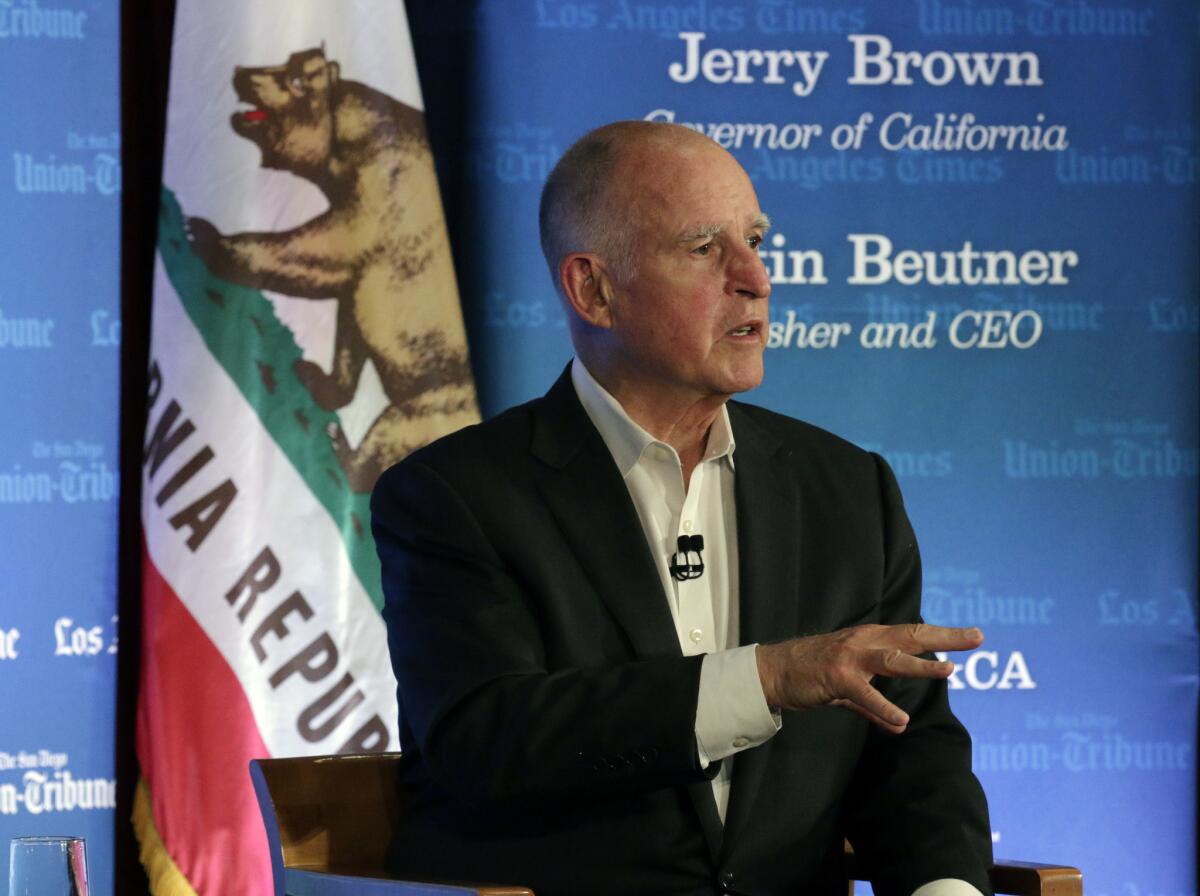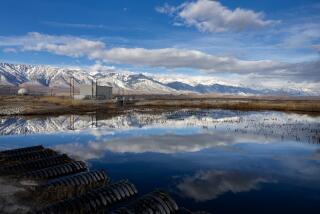Analysis: Crisis or not? Jerry Brown avoids offering stern advice on drought

Gov. Jerry Brown talks during āWater in the West,ā a discussion about the California drought held at USC on Tuesday night.
In his latest iteration as Californiaās governor, Jerry Brown seems to have cracked the code of the stateās quirky politics. The code: Weāll elect you, if you promise to fix the mess and leave us alone.
That is what Brown has done, scurrying to Sacramento after his 2010 election and taking on the stateās faltering economy with little in the way of public splash. He only barely resurfaced during his reelection campaign. And in many ways it has worked: Californiansā confidence in both their own economic futures and the stateās finances are up, polls show, and Brown is at near record popularity.
But on Tuesday night, elaborating at length about the drought, Brown offered a glimpse of the limits to that approach when a crisis demands crisp marching orders from a leader.
Brown has always had the capacity to be fascinating and maddening in the same instant, and he was both during an hour of questioning at USC by Los Angeles Times publisher Austin Beutner.
The governor offered little in the way of advice for Californians wondering how, exactly, to trim a quarter of their water usage, the level necessary statewide to satisfy his plan. Instead, there was a lot of Brown-speak, explanations of the nuances needed to forge political solutions and airy soliloquies that seemed intended to avoid nasty specifics.
The governorās drought plan would seem to require him to take a whip to the stateās water wasters--at least the urban ones--but he was far more emphatic and energetic when talking up the threat of climate change, for example, than in dealing with the drought.
Itās true that climate change represents an epochal threat, and the drought may be eased with a season of good hard rain next year. But that thinking seems to contradict the arguments by local and state officials that Californians need to radically change their behavior when it comes to water.
Asked whether all parts of California, including agriculture, have to get used to a new normal, Brown decried the notion of a āglib or premature answerā and defended the stateās maligned almond growers as contributing ācapital and revenue to California--thatās a good thing.ā
āWeāve got a lot to do and how this will shake out, itās too early to tell,ā Brown said. āIf the crisis continues and gets bad, more drastic things will be done.ā
Gets bad?
There was a certain maturity to the argument that Brown was offering: that with something as important as water, it will take a while to get all different facets of the state--north and south, ag and urban, Republican and Democrat--walking in lockstep, if they ever do.
āConsensus takes time,ā he said, pointing to disputes in Washington and the Middle East. āWe are on a pace to forge good policies going forward.ā
Exactly what those policies will be was left to the imagination, though Brown repeatedly allowed that Californians would have to find āmore elegantā ways of using and reusing water.
He did make clear that he knows that water--or, more to the point, the fear of losing access to it--strikes some elemental chord in people, even if he described that with Brownian locution.
āYou said water is a commodity,ā he told Beutner. āSome people call water a right, some people call water the essence of life. Water is more than H20; water is a baptism. Water is a poetry. Water has an iconic role in human history and the human condition, so how we play with water -- itās not like a widget.ā
On the matter of climate change, though, Brown bristled with passion.
āThis is a crisis thatās not like a political problem, Republicans, Democrats, conservatives, liberals,ā he said. āThis goes to the very foundation of what it means to be human in a world of living thingsā¦. The drought is just a very, very tiny foretaste of whatās to come.ā
If he occasionally veers into the esoteric, Brown has an acute and perhaps unparalleled fix on the stateās political compass. Judging from his remarks, it appeared at times Tuesday that the governor had decided on a carrot-and-stick approach, softening his tough cutback plan with gentle nudging rather than verbal wrath.
He noted a recent poll by the Public Policy Institute of California, which found that the drought is now the top issue of concern to Californians, seen as most important by almost twice the percentage that cited jobs and the economy, usually the premier worry.
The governor called that āa very important milestoneā because āwater is fundamental to our lives and to our well-being.ā
āWe donāt know quite how weāre going to make this all work,ā he said. āBut with a little bit of patience and a lot of collaboration and some good science, Iām confident we will deal with our water problem in a very successful way and keep the California dream alive.ā
For political news and analysis, follow me on Twitter: @cathleendecker. For more on California politics, go to latimes.com/decker.
More to Read
Sign up for Essential California
The most important California stories and recommendations in your inbox every morning.
You may occasionally receive promotional content from the Los Angeles Times.











